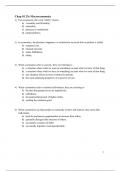Exam (elaborations)
Test Bank for Macroeconomics, 23rd Edition by Campbell McConnell
- Course
- Institution
Test Bank for Macroeconomics, 23rd Edition 23e by Campbell McConnell, Stanley Brue and Sean Flynn. Full Chapters test bank are included - Chapter 1 to 21 PART ONE: INTRODUCTION TO ECONOMICS AND THE ECONOMY Chapter 1: Limits, Alternatives, and Choices Chapter 2: The Market System and the Circ...
[Show more]



